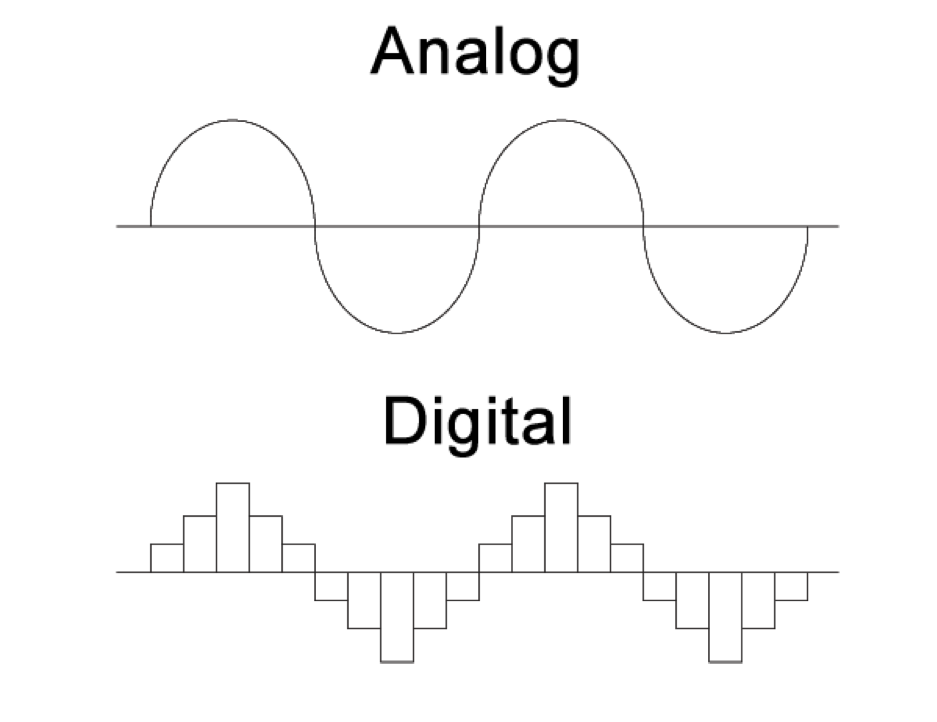Analog vs Digital: Why It Matters to the Modern Musician

When you venture into the world of guitars and gear, you will inevitably enter the debate of analog vs. digital. I first encountered the terms while researching my first delay pedal. I was in a Guitar Center debating between an MXR Carbon Copy and a Boss DD-5, desperately trying to sound like The Edge. The salesman asked me if I preferred an analog or digital delay and, at the time, I honestly wasn’t informed enough to give him an answer. This blog should be able to clear some things up for you if you are in the same position.

Analog:
Scientifically, the difference between analog and digital is that analog signals are continuous sine waves. This means they are 100% natural. This would be the signal of your acoustic guitar or your vinyl record. From a recording standpoint, analog is going to be purer and better replicate the original recording. Analog recordings are “warmer” and have the slight imperfections that give you that retro studio feel.
As far as pedals go, analog pedals are going to be described as “warmer” and “smoother.” These terms will be used most when referring to delay pedals. The signal of your guitar remains analog because the pedal uses transistors and capacitors. Analog delays typically have a Bucket Brigade Device (BBD) chip that adds the delay effect. Analog delays will have a warmer tone, but will have less parameters for you to adjust. They won’t be able to go on forever, but they are great for those vintage tones and subtle delay effects. That MXR Carbon Copy has only 600ms of delay time, but it is one of the most classic delay pedals.

Digital:
Digital signals are going to be binary, represented by ones and zeroes. Examples of digital signals would be a MIDI keyboard or an MP3 file. In the studio, digital doesn’t have the ability to replicate the signal exactly, but it will be clean and crisp. This just means that the recording won’t have the warmth and slight imperfections that come with analog recording. Digital will be easier to edit in the studio than recording direct to tape.
Digital pedals, specifically delay pedals, will have many parameters to adjust and the delay won’t have a limit for how long it can go. Digital pedals use Digital Signal Processing (DSP) chips to create the effect. The pedal converts your signal into digital as it enters the pedal and converts it back to analog when it leaves that pedal. The accuracy of this analog-to-digital-to-analog (ADA) conversion differs with every delay pedal. Ideally, you would want a high conversion rate to preserve most of your original signal. (the Strymon Timeline and many others have 24-bit resolution). A digital delay would have been a great option for me back in that Guitar Center (although I still haven’t been able to sound exactly like The Edge).
At the end of the day, the common ear won’t always notice the difference between the two, but for the tone-obsessed, it will always be an ongoing discussion. There are plenty more details that separate the two, this blog was just meant to introduce the concepts. There is definitely a place in music for both and there are situations in every genre of music where you would want one or the other. The digital world keeps advancing, but there will always be purists who insist analog is the only option, whether it’s their favorite albums or delay pedals.

Comments
Jonathan Payant said:
In a digital pedal, the sound is converted to ones and zeros (computer language) when it enters, then reconverted to analog sound before leaving the pedal. The difference is mostly noticeable with distortion, which will often sound edgier and more artificial after having been through the conversion. Even if you have 5 analog pedals, and then a digital delay at the end, all your sound goes through the back/forth conversion process as it passes through that digital pedal. There are different quality of DAC (digital audio converters) and not all pedal manufacturers use the best components.
Ryan said:
I found audio conversion to be a key factor for digital, especially when recording guitar.
This may help guitar players. https://www.playguitarlive.com/audio-conversion/